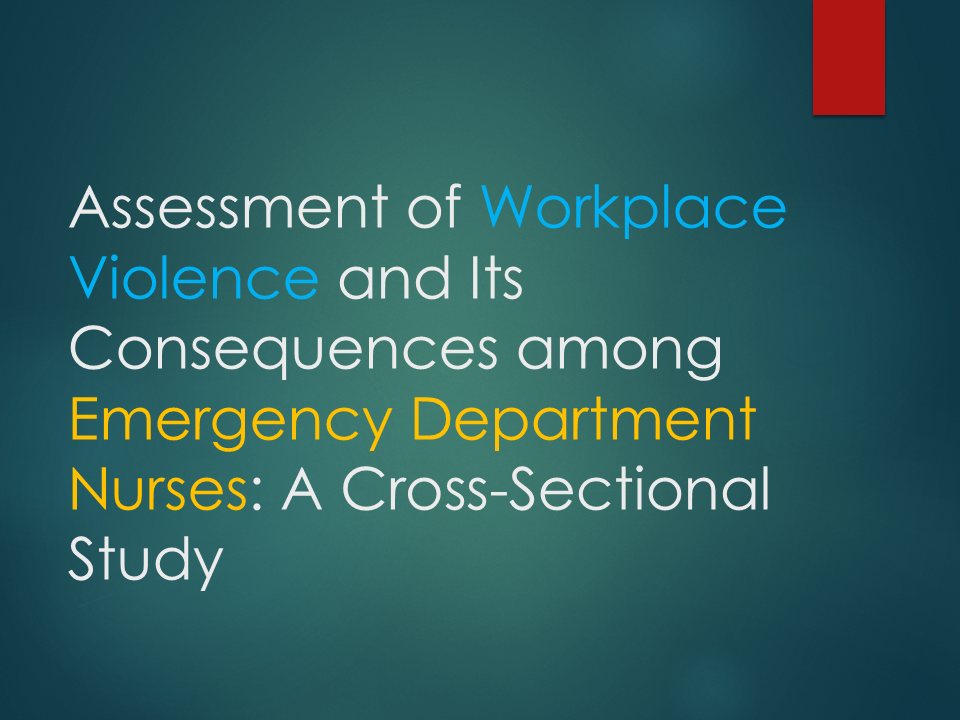Assessment of Workplace Violence and Its Consequences among Emergency Department Nurses: A Cross-Sectional Study
DOI:
https://doi.org/10.23917/bik.v18i2.10702Keywords:
Workplace, emergency nurses, Cross Sectional Study, violence, verbal abuseAbstract
Workplace violence against nurses in Emergency Departments (ED) is a universal problem that impacts the well-being of staff and quality of care, specifically in Mosul City, Iraq, where healthcare workers continuously report aggression. The present study assesses experiences of workplace violence against ED nurses in Mosul, its characteristics and types, along with effective interventions by targeting factors contributing to the underlying reasons. A quantitative, cross-sectional study with 111 nurses from four large public hospitals in Ninevah, Mosul. Demographic data, experience of violence, causes, and perceptions concerning the attitude of nurses relating to reporting and retaliation were determined from the demographic questionnaire and a structured questionnaire based on the Workplace Violence in Healthcare Scale (WVHS), which had been previously validated. Primary data analysis used descriptive and inferential statistics. Verbal abuse and physical assault (78%) were the most common types of violence, followed by sexual harassment, bullying, and racial/ethnic harassment. Emergency department overcrowding was associated with an increased likelihood of staff reporting being cut, stabbed, or shot, with at least one contributing factor in all eight categories. More than half of nurses (53.2%) reported experiencing moderate workplace violence, which caused difficulties with physical health, caregiver functioning, and relationships. Workplace violence in Mosul Emergency Departments is a widespread and multi-faceted issue that will require whole-system approaches, such as improved staffing, targeted training, and legal protection, to improve the safety of work areas
Downloads
References
Arnetz J. E. (2022). The Joint Commission's New and Revised Workplace Violence Prevention Standards for Hospitals: A Major Step Forward Toward Improved Quality and Safety. Joint Commission journal on quality and patient safety, 48(4), 241–245. https://doi.org/10.1016/j.jcjq.2022.02.001
American College of Surgeons. (2024). Workplace violence prevention strategies for healthcare settings. https://www.facs.org/workplace-violence-prevention/
Denieffe, S., Denny, M., & White, M. (2022). Embracing and sustaining telehealth progress: The role of the nurse manager. Journal of nursing management, 30(7), 2457–2460. https://doi.org/10.1111/jonm.13789
Duchesne, E., Nathoo, A., Walker, M., & Bartels, S. A. (2023). Patient and Provider Emergency Care Experiences Related to Intimate Partner Violence: A Systematic Review of the Existing Evidence. Trauma, Violence & Abuse, 24(5), 2901–2921. https://doi.org/10.1177/15248380221118962
Kiymaz, D., & Koç, Z. (2023). Workplace violence, occupational commitment and intention among emergency room nurses: A mixed-methods study. Journal of Clinical Nursing, 32(5–6), 764–779. https://doi.org/10.1111/jocn.16331
Kuhlmann, E., Brînzac, M. G., Czabanowska, K., Falkenbach, M., Ungureanu, M.-I., Valiotis, G., Zapata, T., & Martin-Moreno, J. M. (2023). Violence against healthcare workers is a political problem and a public health issue: a call to action. European Journal of Public Health, 33(1), 4–5. https://doi.org/10.1093/eurpub/ckac180
Kumari, A., Kaur, T., Ranjan, P., Chopra, S., Sarkar, S., & Baitha, U. (2020). Workplace violence against doctors: Characteristics, risk factors, and mitigation strategies. Journal of Postgraduate Medicine, 66(3), 149–154. https://doi.org/10.4103/jpgm.JPGM_96_20
Mento, C., Silvestri, M. C., Bruno, A., Muscatello, M. R. A., Cedro, C., Pandolfo, G., & Zoccali, R. A. (2020). Workplace violence against healthcare professionals: A systematic review. Aggression and Violent Behavior, 51, 101381. https://doi.org/https://doi.org/10.1016/j.avb.2020.101381
Recsky, C., Moynihan, M., Maranghi, G., Smith, O. M., PausJenssen, E., Sanon, P.-N., Provost, S. M., & Hamilton, C. B. (2023). Evidence-Based Approaches to Mitigate Workplace Violence From Patients and Visitors in Emergency Departments: A Rapid Review. Journal of Emergency Nursing, 49(4), 586–610. https://doi.org/10.1016/j.jen.2023.03.002
Sari, D., Yildirim, D., & Büyükavci, G. (2023). Prevalence and risk factors of workplace violence against healthcare workers: A cross-sectional study. Journal of Nursing Management, 31(2), 345–354. https://doi.org/10.1111/jonm.13789
Spector, P. E., Zhou, Z. E., & Che, X. X. (2014). Nurse exposure to physical and nonphysical violence, bullying, and sexual harassment: a quantitative review. International Journal of Nursing Studies, 51(1), 72–84. https://doi.org/10.1016/j.ijnurstu.2013.01.010
Spelten, E., Thomas, B., O’Meara, P., van Vuuren, J., & McGillion, A. (2020). Violence against Emergency Department nurses: Can we identify the perpetrators? PloS One, 15(4), e0230793. https://doi.org/10.1371/journal.pone.0230793
Wei, C. Y., Chiou, S. T., Chien, L. Y., & Huang, N. (2016). Workplace violence against nurses--prevalence and association with hospital organizational characteristics and health-promotion efforts: Cross-sectional study. International journal of nursing studies, 56, 63–70. https://doi.org/10.1016/j.ijnurstu.2015.12.012
Zhao, S. H., Shi, Y., Sun, Z. N., Xie, F. Z., Wang, J. H., Zhang, S. E., Gou, T. Y., Han, X. Y., Sun, T., & Fan, L. H. (2018). Impact of workplace violence against nurses' thriving at work, job satisfaction and turnover intention: A cross-sectional study. Journal of clinical nursing, 27(13-14), 2620–2632. https://doi.org/10.1111/jocn.14311
Zhao, Shihong, Xie, F., Wang, J., Shi, Y., Zhang, S., Han, X., Sun, Z., Shi, L., Li, Z., Mu, H., Liu, X., Liu, W., Gao, L., Sun, T., & Fan, L. (2018). Prevalence of Workplace Violence Against Chinese Nurses and Its Association with Mental Health: A Cross-sectional Survey. Archives of Psychiatric Nursing, 32(2), 242–247. https://doi.org/https://doi.org/10.1016/j.apnu.2017.11.009

Submitted
Accepted
Published
How to Cite
Issue
Section
License
Copyright (c) 2025 Mohammed Salih Jasim

This work is licensed under a Creative Commons Attribution 4.0 International License.















